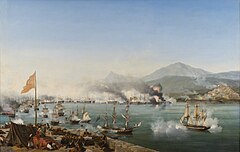
Back حرب التحرير الوطني Arabic شەڕەکانی ئازادیی نەتەوەیی CKB Militoj de nacia liberigo Esperanto Oslobodilački rat Croatian Perang pembebasan nasional ID ਕੌਮੀ ਮੁਕਤੀ ਇਨਕਲਾਬ Punjabi قومی آزادی دیاں جنگاں PNB Guerra de libertação nacional Portuguese Oslobodilački rat Serbo-Croatian Luftërat çlirimtare Albanian

Wars of national liberation, also called wars of independence or wars of liberation, are conflicts fought by nations to gain independence. The term is used in conjunction with wars against foreign powers (or at least those perceived as foreign) to establish separate sovereign states for the rebelling nationality. From a different point of view, such wars are called insurgencies or rebellions.[1] Guerrilla warfare or asymmetric warfare is often utilized by groups labeled as national liberation movements, often with support from other states. The term "wars of national liberation" is most commonly used for those fought during the decolonization movement. Since these were primarily in the third world, against Western powers and their economic influence, and a major aspect of the Cold War, the phrase has often been applied selectively to criticize the foreign power involved.[2]
Some of these wars were either vocally or materially supported by the Soviet Union, which claimed to be an anti-imperialist power, supporting the replacement of Western-backed governments with local Communist or other non pro-Western parties.[1][3] In January 1961 Soviet premier Nikita Khrushchev pledged support for "wars of national liberation" throughout the world.[4] On the other hand, the Soviet involvement was often viewed as a way to increase the size and influence of the Soviet Bloc, and thus a form of imperialism itself. The People's Republic of China criticized the Soviet Union as being social imperialist. In turn, China presented themselves as models of independent nationalist development outside of Western influence, particularly as such posturing and other long-term hostility meant they were regarded as a threat to Western power and regarded themselves as such, using their resources to politically, economically and militarily assist movements such as in Vietnam. When the nation is defined in ethnic terms, wars fought to liberate it have often entailed ethnic cleansing or genocide in order to rid the claimed territory of other population groups.[5][6][7]
- ^ a b Rubinstein, Alvin Z. (1990). Moscow's Third World Strategy. Princeton University Press. p. 80. ISBN 0-691-07790-8.
- ^ McNamara, Robert S. (1965-08-30). "Buildup of U.S. Forces in VietNam, Statement by Secretary of Defense, Robert S. McNamara, Before the Subcommittee on Department of Defense Appropriations of the Senate Committee on Appropriations on August 4, 1965". Department of State Bulletin: 369. Retrieved 2010-07-16.
- ^ Ballard, Chet; Gubbay, Jon; Middleton, Chris (1997). The Student's Companion to Sociology. Wiley-Blackwell. p. 36. ISBN 0-7567-7867-0.
- ^ Little, Wendell E. (1980). "Wars of National Liberation—Insurgency". Air University Review (September–October). Retrieved 2010-07-16.
- ^ Lieberman, Benjamin (2013). Terrible Fate: Ethnic Cleansing in the Making of Modern Europe. Rowman & Littlefield. ISBN 978-1-4422-3038-5.
- ^ Hayden, Robert M. (1996). "Schindler's Fate: Genocide, Ethnic Cleansing, and Population Transfers". Slavic Review. 55 (4): 727–748. doi:10.2307/2501233. ISSN 0037-6779. JSTOR 2501233. S2CID 232725375.
"Rendering an area ethnically homogenous by using force or in- timidation to remove from a given area persons of another ethnic or religious group" seems, in fact, an essential element in the program of many state builders and national liberation movements.
- ^ Kelman, Herbert C. (1997). "Negotiating National Identity and Self-Determination in Ethnic Conflicts: The Choice Between Pluralism and Ethnic Cleansing". Negotiation Journal. 13 (4): 327–340. doi:10.1023/A:1024840110195. S2CID 189900927.